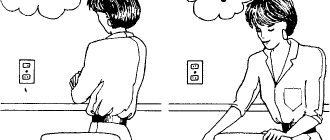Frustration - what does it mean? Imagine that you have been waiting for a concert of your favorite artist for a long time. We took time off from work, bought tickets in advance, and made plans to meet with friends. And suddenly the boss decides that you definitely need to be in the office on this day. How will you feel when you hear this news? Surely it will be disappointment, anger, helplessness and severe resentment. This state is called frustration. Why is it developing? And how to deal with it?
What is frustration - definition in psychology
Frustration is a mental state that occurs when a person, for some reason, cannot satisfy his need or fulfill his desire. In this case, the obstacle is external circumstances or internal reasons.
Frustration occurs under the following conditions:
- An individual has a need or desire that he plans to satisfy.
- An action plan has been drawn up in advance, explaining how and what is best to do.
- On the way to realizing your plans, external or internal obstacles arise, sometimes insurmountable.
In short, by definition in psychology, frustration is a typical reaction to disappointment, unrealistic hopes, and the impossibility of self-realization. All these situations are called frustration. Obstacles that arise on a person’s path are called frustrators or frustrating influences. The reaction to frustration is frustration tension. The higher it is, the more difficult it is for an individual to adapt to new conditions. At this moment, the body’s psychophysiological reserves work at full capacity, which ultimately leads to moral and physical exhaustion.
The state of frustration largely depends on how strong a person’s psyche is. Therefore, it manifests itself in different ways. Someone experiences slight sadness and annoyance. Others face unbearable suffering. In both cases the emotions are negative.
The development of frustration, the strength of sensations and their duration are determined by two factors:
- How important was a goal for a person that he was unable to achieve, or an unmet need. Let's give an example. Let’s say a girl didn’t have time to go to the store, which is why she didn’t buy a new dress for an important meeting. Or a married couple, dreaming of children for a long time, once again encountered failure with IVF. There will be experiences in both cases. But in the second, the state of frustration will be many times stronger.
- Psychological state of a person. Does he know how to find a way out of critical situations, does he have leadership qualities, can he soberly assess the situation and make decisions.
The types of reactions to frustration in the described cases vary. The meaning of the word “frustration” in Greek is the collapse of hopes. So, being disappointed, a person can completely abandon an unattained goal or need. This is one option. There are two others:
- change the goal while maintaining available resources;
- still go forward, simultaneously finding ways to get around the obstacles that stand in the way.
In simple terms, the concept of frustration arises when a person is simply unable to change circumstances. Let's go back to the example with the girl who didn't have time to go to the store. But there are also others that she can stop by before the meeting. This means that she has nothing to worry about. But in the case of the inability to give birth to a child, the situation is more complicated. Here, frustration refers to insurmountable obstacles that are almost impossible to eliminate.
Gestalt psychology and gestalt therapy
The concept of Gestalt psychology appeared around 1912, when Max Wertheimer described the phenomenon of the irreducibility of the perception of the whole to a collection of individual elements.
What is Gestalt? This term refers to the concept of a single whole, which is something different from the sum of its individual parts. What the two terms have in common is only the word gestalt. The founder of therapy, Perls, had a superficial understanding of Gestalt psychology, having mastered only part of the fundamental works devoted to this issue. He used some ideas, but nothing more.
Gestalt is a direction in psychology, and therapy contains only a small part of its elements. It is a mixture of psychodrama, analytics and bioenergetics.
Gestalt psychology - what is it in simple words? This is a scientific direction aimed at studying the characteristics of human perception. Several interesting features of the psyche were found experimentally, such as the laws of correlation and grouping of objects.
The basic principle of Gestalt psychology: the whole is not just the sum of its parts, but something more significant. A person perceives his surroundings holistically, that is, he does not see a collection of individual lines and points (a tree, and not a set of leaves, branches and a trunk).
This branch of psychology considers the existence of two “human worlds”:
- Physical, which does not affect personal experiences
- The world of sensations reflects the influence of many external factors on our consciousness.
Gestalt psychology did not accept the principles of dividing consciousness into its component parts. Representatives of this direction noted that perception is not formed only through sensations, and the properties of a figure cannot be described by characterizing each part separately. The human consciousness collects each piece of the mosaic and forms a single whole, forming a gestalt. What it is?
People must be aware of their needs, emotions and feelings, communication preferences and perceptions of the outside world. Gestalt psychology does not focus on quickly resolving minor problems. At its core there is something more. Working with a specialist in this field will allow you to completely reconsider your life position and completely immerse yourself in the real world.
In order to achieve a holistic perception and orderliness of its structure, it is necessary to resort to the basic principles of Gestalt:
- The principle of proximity - those images that are nearby are perceived together.
- The principle of similarity is that several forms that have a common size, shape, and color are perceived together.
- The principle of closure - consciousness strives to complete the missing parts of the figure, which subsequently takes on its full form.
- The principle of integrity - the world is perceived in a simplified and holistic form.
- The principle of contiguity is characterized by the proximity of stimuli in time and space.
- Common area - the listed concepts form our complete perception of reality, taking into account past life experiences.
Theories of frustration
The state of frustration has always been a lively discussion in the world of psychology. This has led to several related theories.
D. Dollard's theory
According to this theory of frustration, it is closely related to aggression. The nature of this emotion has been studied by many scientists. And here's what they found out:
- Biologists believe that the gene for aggressiveness is inherent in a person from the moment he is born. In men, due to the greater amount of testosterone, it manifests itself more strongly, and in women it is weaker.
- Sigmund Freud said that aggression indicates self-destruction and that a person is not satisfied sexually.
- Sociologists are confident that the reason for aggressive behavior lies in relationships within the family.
As for Dollard's theory, it says that aggression invariably brings with it experiences and vice versa. The strength of aggression directly depends on the significance of the unachieved goal and the difficulty that stood in the way of achieving it. But this is not the most interesting thing. According to the scientist, this negative emotion is directed not at obstacles or circumstances, but at those people who have nothing to do with them.
The nature of triggers
Can only fears experienced in childhood cause triggers?
Many of the emotional triggers come from perfectionism. We're embarrassed to admit that we get angry when a colleague gets a promotion. Or when our best friend gets pregnant for the second time and we're still struggling with fertility.
Regardless of the topic that causes you these unpleasant feelings, you need to stop being ashamed of them. Try asking yourself, “What is it about this person's experience or capabilities that makes me so angry?”
If we can ask ourselves this question, we are more likely to begin to discover our emotional triggers.
A trigger can be caused not only by negative, but also by positive emotions.
For example, the smell of perfume “elusive to consciousness” can mentally return us to a romantic moment from the distant past.
Signs of frustration
Signs of frustration do not always manifest themselves in full force, so this condition often goes unnoticed. But it is still possible to diagnose it.
So, the following symptoms are characteristic of frustration:
- Focus on the problem situation. A person cannot think about anything else, which is why he ignores what is happening in other areas of life.
- Helplessness, hopelessness. The individual realizes that he needs to be distracted, but he is not able to do this.
- An ongoing feeling of inner anxiety, melancholy. It seems that life has lost its colors. All this provokes the development of a depressive state.
- Decreased performance, laziness, apathy. The desire to do anything completely disappears. Motivation goes away along with it.
- Low self-esteem, guilt, lack of confidence in yourself and your abilities.
To the listed signs of frustration one can add indulgence, isolation, and refusal of any contact with the world.
Emotional trigger
An emotional trigger is any topic that makes us feel uncomfortable. Emotional triggers tell us in what aspects of our lives we feel disappointed or dissatisfied.
As mentioned above, triggers can be different for each person because we are all “struggling” with something different.
Once we can identify what's troubling us, we can take steps to protect our mental health.
While it is impossible to avoid all situations that can make us angry, we can take effective steps to take care of ourselves and develop a strong inner voice that can help us navigate these uncomfortable situations.
Knowing your emotional triggers can help you avoid exposing yourself to certain situations and digital content that are harmful to your mental health and may cause unpleasant emotions.
The point is not to run away from these situations and create a bubble that separates you from the outside world. Awareness only helps, by knowing our limitations, to avoid (as much as possible) situations that harm our health and self-esteem.
Causes
Conventionally, the causes of frustration are divided into 3 groups:
- Social, moral, ethical. In any of his actions, a person takes into account social norms or even his own concepts of what is good and what is bad. An example is sexual dissatisfaction associated with the widespread belief that one should not enter into intimate relationships before marriage.
- Physical, biological. Let's give a simple example of frustration. You planned a serious event, but suddenly you broke your leg and ended up in the hospital. You wanted to carry out your plans, but circumstances played against you.
- Psychological. An individual cannot achieve a goal due to the fact that he considers himself not strong enough, smart enough, etc. He suffers from low self-esteem, some fears, and complexes.
Also, reasons can be divided into external and internal. The first include improper upbringing, frequent conflicts, dissatisfaction with the place occupied in society. The internal reasons for the development of frustration are contradictions in the process of setting goals. Thus, a person can try to simultaneously satisfy desires that are opposite to each other. One will be fulfilled, but the second, accordingly, will not. This is how frustration arises.
Forms
In psychology, there are 3 forms of frustration. The first is extrapunitive. What it is? This is a state when a person believes that circumstances and the people around him are to blame for his failures. He shows aggression towards them and at the same time strives to achieve his goal. It is not possible to achieve what you want, therefore, aggression, as well as frustration in general, intensifies.
The second form is called intrapunitive. It means that a person focuses on himself as the cause of failure. He becomes withdrawn, depressed, and anxious. Added to these negative emotions is a loss of meaning in life and complete apathy. The individual cannot perform even simple everyday activities, in particular, take care of the house and himself.
And finally, the third form of frustration is impunitive. A person shows complete indifference to the difficulties along his path, or considers them fate, predestination. He does not blame anyone for failures, but simply gives up desires and needs or switches to something else.
Types of frustration
Types of frustration differ from each other in the area of life in which a person was unable to get what he wanted. There are several of them.
Love and sexy
The first appears in cases where there is a break in relationships or some serious problems. Without receiving reciprocal feelings, a person experiences an increase in his attraction to the object of passion. Such an emotional outburst sometimes leads to inappropriate behavior, manifested in an obsessive desire to meet or even violence.
Frustration looks almost the same in existing families, when one of the partners does not receive from the other what he needs, for example, attention. The lack of what you want causes a lot of negative emotions. It doesn’t matter what kind of relationship there is in the family.
As for the intimate sphere, frustration here is not much different from love. Without receiving satisfaction, the partner becomes aggressive and irritable.
Social
Social frustration occurs in cases where there are conflict situations in relationships with society. It appears if a person cannot get the desired position, social status, the opportunity to study at the chosen educational institution, etc.
It is worth noting that diseases that limit mental and physical activity are also involved in the development of social frustration.
Frustration of needs
We are talking about Maslow's pyramid of needs mentioned above. Failures and mistakes are not needed to develop this type of frustration. It occurs after the need is satisfied. Why? Because the individual faces a new goal. And so on in a circle. The inability to satisfy absolutely all existing needs causes frustration.
Frustration in relationships
We are not talking about romantic relationships, although this type of frustration is most often mentioned in connection with them. It's about relationships with people around you. Disappointment, aggression, and resentment arise in cases where an individual cannot defend his opinion and makes concessions, does what he does not want. Unable to refuse, he gives in to his opponent, which is why he subsequently experiences anger and other unpleasant emotions.
False
This state is similar to frustration with expressed emotions. But they have less power. You can cope with them without resorting to the help of a specialist.
False frustration occurs when the functioning of those parts of the nervous or endocrine system that are responsible for emotions is disrupted. For example, an excess amount of adrenaline causes emotions in a person similar to those that appear during frustration.
Existential
Existential frustration is a condition characterized by disappointment in life in general. An individual loses the meaning and purpose of existence for many reasons. Among them:
- dismissal amid high unemployment;
- retirement;
- completion of training in the absence of the opportunity to get a job in the specialty;
- complicated divorce;
- economic and political changes in the state.
It is difficult for a person to adapt to new conditions. He does not see opportunities to realize his abilities, so he experiences boredom and apathy. Over time, such circumstances lead to the development of neurosis. And it entails a deterioration in relationships with others, an attraction to alcohol and drugs.
Consequences
So what is frustration? These are negative emotions caused by the inability to get what you want, insurmountable obstacles to achieving your goal. Ideally, the response to frustration should be positive. This means that a person is looking for ways to get around problems and difficulties or learning from mistakes made. But it also happens that the negativity drags on. In these cases, emotional frustration has the following consequences:
- Aggression. This emotion can be directed at a problem or circumstance, or at people who have nothing to do with the situation. It manifests itself in the deliberate creation of conflict situations, hostility and even physical violence. The individual cannot control himself.
- Auto-aggression. The same as aggression, only it is directed at oneself. The main manifestation is self-destruction. A person deliberately risks his life, ignores the body’s alarm signals and refuses treatment, and develops bad habits.
- Retreat. In this case, one of the defense mechanisms is used - depreciation. A person who cannot get what he wants reduces its importance. This happens not only in words, but also in behavior. So, he can perform impulsive actions and make strange decisions.
- Regression. It was said above that during regression, trying to protect oneself from negative emotions and experiences, a person returns to the previous level of emotional development. It all looks something like this: having failed to achieve his goals, he freaks out, cries, and blames those around him for everything.
- Fixation. The individual realizes that he will not be able to fulfill a desire or satisfy a need. Therefore, he simply “fixes” himself in his normal state. He lives the same way as before, but aimlessly.
- Pointless activity. Experiencing strong anger and other negative emotions, a person decides to channel them in what he thinks is the right direction. But in fact, all his actions are meaningless and disordered. They don't bring any benefit.
And, probably, the most common consequence of frustration is apathy. Its main danger is the high risk of developing into depression.
How to get rid of frustration
First you need to learn to control negative emotions. It is important to eradicate them at the moment they appear. Thanks to this, you can avoid senseless, impulsive actions. Self-regulation techniques, for example, concentration on breathing, will be of great help in this.
Learning to live here and now
Learn to enjoy the present moment and your life will improve significantly. This can be achieved through many exercises. For example, try to experience the feeling of an experience at a given moment in time. This is actually very difficult to do. But the main thing is to focus your attention on the world around you.
To do this, you should focus on the main senses: be aware of colors, smells, sounds. At the same time, do not forget to describe all your sensations, starting with the words: “I am here and I realize that...”
The exercises are designed to simultaneously become aware of yourself and the world around you. While performing them, try to analyze your actions and the purpose of their use.
Examples of frustration from life
Probably every person has encountered frustration. Imagine a situation familiar to many: a man is going to watch an important football match for him. He did everything in his power to achieve this: he agreed with his boss to leave early, bought his favorite beer and snack, and invited friends. The first difficulty is a traffic jam. But it has been successfully overcome. The match starts at 17-00, there is still time to prepare. And now the guests are assembled, the table is set, the referee is preparing to blow the whistle to start the match. And suddenly, due to scheduled work, the electricity goes out. Frustration arises.
In this case, the difficulties that stand in the way of the hero can be overcome, for example, by going with friends to a sports bar.
I'll give you an example from my life. I get frustrated in the morning. Usually in the evening I draw up a rough action plan and set an alarm for a certain time. It seems simple. But in the morning I manage to miss the alarm and oversleep. Naturally, I get up after this in a bad mood and with no desire to work at all.
In my situation, the obstacle is also easy to overcome. It is enough to go to bed a little earlier, and in the morning do not lie down, but get up at the first alarm signal.
How to recognize your emotional triggers?
These may look different for each person, but there are a number of things that can help you identify your emotional triggers:
A close friend or relative shares some good news about themselves. You're happy for him, but you can't help but feel jealous.
What is this news about?
- Career advancement?
- New car?
- Is she getting married?
- Does he have a new relationship?
- Are they expecting a baby?
Ask yourself the following questions:
- Have you noticed that there is someone you follow on social media that you constantly compare yourself to?
- What bothers you most about his/her messages? How do you deal with this?
- Have you noticed that there is a topic of conversation that "pops up" every time you interact with friends and/or family?
Answering these questions will help you get closer to identifying your emotional triggers.











